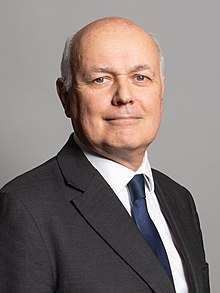
Back إيان دنكن سميث Arabic لاين دونكان سميث ARZ ইয়ান ডানকান স্মিথ Bengali/Bangla Iain Duncan Smith Welsh Iain Duncan Smith Danish Iain Duncan Smith German Iain Duncan Smith Spanish یین دانکن اسمیت Persian Iain Duncan Smith Finnish Iain Duncan Smith French
Sir Iain Duncan Smith | |
|---|---|
 Official portrait, 2020 | |
| Secretary of State for Work and Pensions | |
| In office 12 May 2010 – 18 March 2016 | |
| Prime Minister | David Cameron |
| Preceded by | Yvette Cooper |
| Succeeded by | Stephen Crabb |
| Leader of the Opposition | |
| In office 13 September 2001 – 6 November 2003 | |
| Monarch | Elizabeth II |
| Prime Minister | Tony Blair |
| Preceded by | William Hague |
| Succeeded by | Michael Howard |
| Leader of the Conservative Party | |
| In office 13 September 2001 – 6 November 2003 | |
| Preceded by | William Hague |
| Succeeded by | Michael Howard |
| Chair of the Social Justice Policy Group | |
| Assumed office 12 September 2016 | |
| Preceded by | Rory Brooks |
| In office 7 December 2005 – 12 May 2010 | |
| Preceded by | Office established |
| Succeeded by | Mark Florman |
| Member of Parliament for Chingford and Woodford Green Chingford (1992–1997) | |
| Assumed office 9 April 1992 | |
| Preceded by | Norman Tebbit |
| Majority | 4,758 (10.8%) |
| Shadow Cabinet portfolios | |
| 1997–1999 | Shadow Secretary of State for Social Security |
| 1999–2001 | Shadow Secretary of State for Defence |
| Personal details | |
| Born | George Ian Duncan Smith 9 April 1954 Edinburgh, Scotland |
| Political party | Conservative |
| Spouse |
Betsy Fremantle (m. 1982) |
| Children | 4 |
| Residence(s) | Swanbourne, Buckinghamshire, England |
| Alma mater | Royal Military Academy Sandhurst |
| Nickname | IDS |
| Military service | |
| Branch/service | British Army |
| Years of service | 1975–1981 |
| Rank | Lieutenant |
| Unit | Scots Guards |
| Battles/wars | The Troubles |
Sir George Iain Duncan Smith (born 9 April 1954), often referred to by his initials IDS, is a British politician who was Leader of the Conservative Party and Leader of the Opposition from 2001 to 2003. He was Secretary of State for Work and Pensions from 2010 to 2016. He has been Member of Parliament (MP) for Chingford and Woodford Green, formerly Chingford, since 1992.
The son of W. G. G. Duncan Smith, a Royal Air Force flying ace, Duncan Smith was born in Edinburgh and raised in Solihull. After education at the HMS Conway training school and Royal Military Academy Sandhurst, he served in the Scots Guards from 1975 to 1981, seeing tours in Northern Ireland and Rhodesia. He joined the Conservative Party in 1981. After unsuccessfully contesting Bradford West in 1987, he was elected to Parliament at the 1992 general election. He was a backbencher during the premiership of John Major. During the leadership of William Hague he was Shadow Secretary of State for Social Security between 1997 and 1998, and Shadow Secretary of State for Defence from 1998 to 2001.[1]
Following the resignation of William Hague, Duncan Smith won the 2001 Conservative Party leadership election, partly owing to the support of Margaret Thatcher for his Eurosceptic beliefs. However, many Conservative MPs came to consider him incapable of winning the next general election and, in 2003, he lost a vote of confidence in his leadership; he immediately resigned and was succeeded by Michael Howard. Returning to the backbenches, Duncan Smith founded the Centre for Social Justice, a centre-right think tank independent of the Conservative Party, and became chair of its Social Justice Policy Group.
In May 2010, new Prime Minister David Cameron appointed him to serve in the cabinet as Secretary of State for Work and Pensions. During his tenure, he was responsible for seeing through changes to the welfare state. He resigned from the cabinet in March 2016, in opposition to Chancellor George Osborne's proposed cuts to disability benefits, returning to the backbenches, where he remains.
- ^ Blackhurst, Chris (9 October 2001). "The contradictory world of Iain Duncan Smith". The Independent. London. Retrieved 18 November 2023.